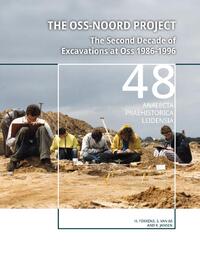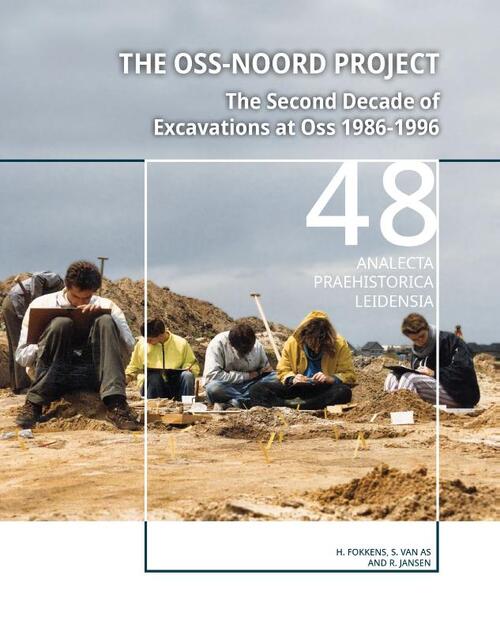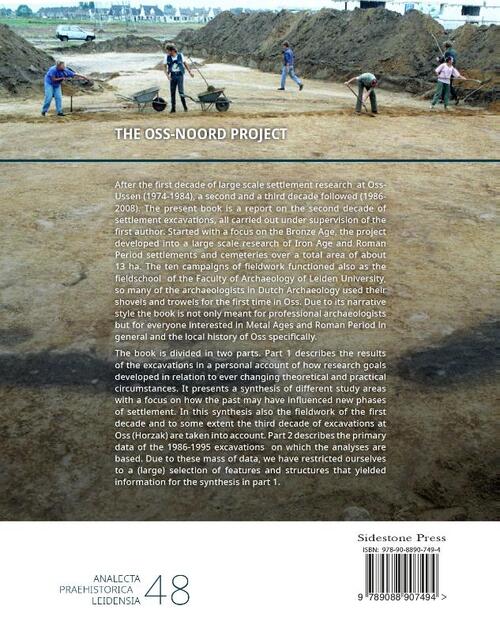245.-
After the first decade of large scale settlement research at Oss-Ussen (1974-1984), a second and a third decade followed (1986-2008). The present book is a report on the second decade of settlement excavations, all carried out under supervision of the first author. Started with a focus on the Bronze Age, the project developed into a large scale research of Iron Age and Roman Period settlements and cemeteries over a total area of about 13 ha. The ten campaigns of fieldwork functioned also as the fieldschool of the Faculty of Archaeology of Leiden University, so many of the archaeologists in Dutch Archaeology used their shovels and trowels for the first time in Oss. Due to its narrative style the book is not only meant for professional archaeologists but for everyone interested in Metal Ages and Roman Period in general and the local history of Oss specifically.
The book is divided in two parts. Part 1 describes the results of the excavations in a personal account of how research goals developed in relation to ever changing theoretical and practical circumstances. It presents a synthesis of different study areas with a focus on how the past may have influenced new phases of settlement. In this synthesis also the fieldwork of the first decade and to some extent the third decade of excavations at Oss (Horzak) are taken into account.
Part 2 describes the primary data of the 1986-1995 excavations on which the analyses are based. Due to these mass of data, we have restricted ourselves to a (large) selection of features and structures that yielded information for the synthesis in part 1.
Contents:
Preface
PART 1: Analysis
Chapter 1: Introduction to the project
1.1 Introduction
1.2 The genesis of the Maaskant
1.3 History of the Oss-North Project: continuity and change
1.4 Aims of the project
1.5 Research questions
1.6 Structure of the book: a narrative approach
Chapter 2: Methods and methodology
2.1 Introduction
2.2 Field campaigns
2.3 Staff and students
2.4 Field methods and finds registration
2.5 Documentation and description
Chapter 3: Chronology and typology of structures
3.1 Introduction
3.2 Houses
3.3 Outbuildings and granaries
3.4 Wells and watering holes
3.5 Ditches
3.6 Fences
3.7 Finds
Chapter 4: Excavations in the Mikkeldonk district
4.1 Introduction
4.2 History of reseach
4.3 Episodes of settlement in the Mikkeldonk quarter
Chapter 5: Excavations in the Schalkskamp district (1990 - 1992)
5.1 Short history of research
5.2 Pits and wells of the Early Bronze Age - Middle Bronze Age: the first signs of habitation in the Schalkskamp area
5.3 Late Bronze Age - Early Iron Age
5.4 The Middle Iron Age
5.5 Late Iron Age settlement: abandonment or disaster?
5.6 The transition from the Iron Age to the Early Roman Period
5.7 The Early Roman Period
5.8 The Late Middle Ages re-use the old settlement area
5.9 An anecdote about the early Modern Period
Chapter 6: Excavations in the Mettegeupel district (1993-1995)
6.1 Background
6.2 Diachronic development of the cultural landscape
Chapter 7: Excavations in the Almstein district (1995)
7.1 Introduction
7.2 Three granaries from the Early or Middle Iron Age
7.3 A settlement of the Middle to the Late Iron Age
7.4 The Roman Period
7.5 The Middle Ages and Modern Period
Chapter 8: Vegetation and crops in Oss-North
8.1 Oss-North and the vegetation on the yards of its Bronze, Iron Age and Early Roman Age farms
8.2 The crops of the Oss-North farmers during the Bronze Age and Iron Age
Chapter 9: The animal bones of Mettegeupel,...
The book is divided in two parts. Part 1 describes the results of the excavations in a personal account of how research goals developed in relation to ever changing theoretical and practical circumstances. It presents a synthesis of different study areas with a focus on how the past may have influenced new phases of settlement. In this synthesis also the fieldwork of the first decade and to some extent the third decade of excavations at Oss (Horzak) are taken into account.
Part 2 describes the primary data of the 1986-1995 excavations on which the analyses are based. Due to these mass of data, we have restricted ourselves to a (large) selection of features and structures that yielded information for the synthesis in part 1.
Contents:
Preface
PART 1: Analysis
Chapter 1: Introduction to the project
1.1 Introduction
1.2 The genesis of the Maaskant
1.3 History of the Oss-North Project: continuity and change
1.4 Aims of the project
1.5 Research questions
1.6 Structure of the book: a narrative approach
Chapter 2: Methods and methodology
2.1 Introduction
2.2 Field campaigns
2.3 Staff and students
2.4 Field methods and finds registration
2.5 Documentation and description
Chapter 3: Chronology and typology of structures
3.1 Introduction
3.2 Houses
3.3 Outbuildings and granaries
3.4 Wells and watering holes
3.5 Ditches
3.6 Fences
3.7 Finds
Chapter 4: Excavations in the Mikkeldonk district
4.1 Introduction
4.2 History of reseach
4.3 Episodes of settlement in the Mikkeldonk quarter
Chapter 5: Excavations in the Schalkskamp district (1990 - 1992)
5.1 Short history of research
5.2 Pits and wells of the Early Bronze Age - Middle Bronze Age: the first signs of habitation in the Schalkskamp area
5.3 Late Bronze Age - Early Iron Age
5.4 The Middle Iron Age
5.5 Late Iron Age settlement: abandonment or disaster?
5.6 The transition from the Iron Age to the Early Roman Period
5.7 The Early Roman Period
5.8 The Late Middle Ages re-use the old settlement area
5.9 An anecdote about the early Modern Period
Chapter 6: Excavations in the Mettegeupel district (1993-1995)
6.1 Background
6.2 Diachronic development of the cultural landscape
Chapter 7: Excavations in the Almstein district (1995)
7.1 Introduction
7.2 Three granaries from the Early or Middle Iron Age
7.3 A settlement of the Middle to the Late Iron Age
7.4 The Roman Period
7.5 The Middle Ages and Modern Period
Chapter 8: Vegetation and crops in Oss-North
8.1 Oss-North and the vegetation on the yards of its Bronze, Iron Age and Early Roman Age farms
8.2 The crops of the Oss-North farmers during the Bronze Age and Iron Age
Chapter 9: The animal bones of Mettegeupel,...

- : Harry Fokkens, Richard Jansen, Stijn van As
- : Sidestone Press
- : 9789088907456
- : Engels
- : Hardcover
- : 400
- : december 2018
- : 1700
- : 284 x 216 x 32 mm.
- : Analecta Praehistorica Leidensia

